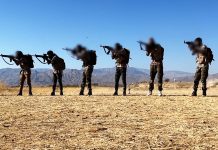Pakistan ordered the enforcement of UN-backed sanctions against Afghanistan’s Taliban on Saturday, reportedly to avoid finance blacklist by the Financial Action Task Force, a Paris-based watchdog.
The orders were issued on Tuesday to enforce the UN regulations on the Taliban. In a statement on Saturday, the foreign office of Pakistan said that the orders are not new, but are laid out in a 2015 UN regulations list. These sanctions would freeze the Taliban’s assets and restrict their travel.
The sanctions target dozens of individuals including major Taliban figures, like Abdul Ghani Baradar, the Taliban chief peace negotiator, and Sirajuddin, the current head of the Haqqani network and the deputy head of the Taliban. Many Taliban leaders have lived and fluidly travelled in Pakistan since the 1980s, and some even own businesses there. In those days, they were the part of the US- and Saudi-led Afghan Mujahideen that strived to dislodge the Soviet Union from Afghanistan, which occurred in 1989.
Pakistan’s decision to sanction the Taliban could be seen as an attempt to pressure Taliban to start intra-Afghan peace talks, which is the second step of the two-step peace deal signed between the US and the Taliban in February in Doha, Qatar. The first step of this deal stipulated that the Taliban and the US will avoid violence on each other across Afghanistan, and the US will withdraw its troops if the results were satisfactory. This step would include negotiations about political power-sharing between the Kabul and the Taliban.
Besides the Taliban, the sanctions also target the Al-Qaeda and the Islamic State affiliates, both of whom have carried out deadly attacks both in Pakistan and in Afghanistan. These sanctions also aim at Tehreek-e-Taliban Pakistan which attacked the Nobel prize winner Malala Yousafzai in 2012 who was then lobbying for the girls’ education in KPK. TTP also attacked Army Public School in Peshawar, killing 145 children and wounding several others. The groups are also responsible for multiple attacks throughout the country.
Suhail Shaheen, the political spokesperson for the Taliban, said on Saturday that the financial sanctions are not new but have been in place for some time now. He said that tightening the travel restrictions can potentially harm the peace talks. “There is a need for a relaxation of such curbs and embargoes because we are entering into another phase of (finding a ) peaceful solution of the Afghan issue”, he said.
Speaking at the condition of anonymity to the media, Pakistani security officials said that these sanctions are an attempt by Pakistan to avoid financial blacklist by the FATF. Currently, only North Korea and Iran are backlisted, which restricts a country’s international borrowing capabilities. FATF, which monitors corruption and terrorists activates, put Pakistan in the grey list, which includes countries with a higher risk of money laundering and terrorism but are committed to working with the FATF for further improvement.






























